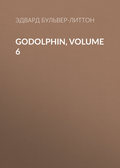
Эдвард Бульвер-Литтон
Night and Morning, Complete
CHAPTER XIV
“Gone, and none know it.
How now?—What news, what hopes and steps discovered!”
BEAUMONT AND FLETCHER: The Pilgrim.
When Philip arrived at his lodgings in town it was very late, but he still found Liancourt waiting the chance of his arrival. The Frenchman was full of his own schemes and projects. He was a man of high repute and connections; negotiations for his recall to Paris had been entered into; he was divided between a Quixotic loyalty and a rational prudence; he brought his doubts to Vaudemont. Occupied as he was with thoughts of so important and personal a nature, Philip could yet listen patiently to his friend, and weigh with him the pros and cons. And after having mutually agreed that loyalty and prudence would both be best consulted by waiting a little, to see if the nation, as the Carlists yet fondly trusted, would soon, after its first fever, offer once more the throne and the purple to the descendant of St. Louis, Liancourt, as he lighted his cigar to walk home, said, “A thousand thanks to you, my dear friend: and how have you enjoyed yourself in your visit? I am not surprised or jealous that Lilburne did not invite me, as I do not play at cards, and as I have said some sharp things to him!”
“I fancy I shall have the same disqualifications for another invitation,” said Vaudemont, with a severe smile. “I may have much to disclose to you in a few days. At present my news is still unripe. And have you seen anything of Lilburne? He left us some days since. Is he in London?”
“Yes; I was riding with our friend Henri, who wished to try a new horse off the stones, a little way into the country yesterday. We went through–and H–. Pretty places, those. Do you know them?”
“Yes; I know H–.”
“And just at dusk, as we were spurring back to town, whom should I see walking on the path of the high-road but Lord Lilburne himself! I could hardly believe my eyes. I stopped, and, after asking him about you, I could not help expressing my surprise to see him on foot at such a place. You know the man’s sneer. ‘A Frenchman so gallant as Monsieur de Liancourt,’ said he, ‘need not be surprised at much greater miracles; the iron moves to the magnet: I have a little adventure here. Pardon me if I ask you to ride on.’ Of course I wished him good day; and a little farther up the road I saw a dark plain chariot, no coronet, no arms, no footman only the man on the box, but the beauty of the horses assured me it must belong to Lilburne. Can you conceive such absurdity in a man of that age—and a very clever fellow too? Yet, how is it that one does not ridicule it in Lilburne, as one would in another man between fifty and sixty?”
“Because one does not ridicule,—one loathes-him.”
“No; that’s not it. The fact is that one can’t fancy Lilburne old. His manner is young—his eye is young. I never saw any one with so much vitality. ‘The bad heart and the good digestion’—the twin secrets for wearing well, eh!”
“Where did you meet him—not near H–?”
“Yes; close by. Why? Have you any adventure there too? Nay, forgive me; it was but a jest. Good night!”
Vaudemont fell into an uneasy reverie: he could not divine exactly why he should be alarmed; but he was alarmed at Lilburne being in the neighbourhood of H–. It was the foot of the profane violating the sanctuary. An undefined thrill shot through him, as his mind coupled together the associations of Lilburne and Fanny; but there was no ground for forebodings. Fanny did not stir out alone. An adventure, too—pooh! Lord Lilburne must be awaiting a willing and voluntary appointment, most probably from some one of the fair but decorous frailties of London. Lord Lilburne’s more recent conquests were said to be among those of his own rank; suburbs are useful for such assignations. Any other thought was too horrible to be contemplated. He glanced to the clock; it was three in the morning. He would go to H– early, even before he sought out Mr. William Smith. With that resolution, and even his hardy frame worn out by the excitement of the day, he threw himself on his bed and fell asleep.
He did not wake till near nine, and had just dressed, and hurried over his abstemious breakfast, when the servant of the house came to tell him that an old woman, apparently in great agitation, wished to see him. His head was still full of witnesses and lawsuits; and he was vaguely expecting some visitor connected with his primary objects, when Sarah broke into the room. She cast a hurried, suspicious look round her, and then throwing herself on her knees to him, “Oh!” she cried, “if you have taken that poor young thing away, God forgive you. Let her come back again. It shall be all hushed up. Don’t ruin her! don’t, that’s a dear good gentleman!”
“Speak plainly, woman—what do you mean?” cried Philip, turning pale.
A very few words sufficed for an explanation: Fanny’s disappearance the previous night; the alarm of Sarah at her non-return; the apathy of old Simon, who did not comprehend what had happened, and quietly went to bed; the search Sarah had made during half the night; the intelligence she had picked up, that the policeman, going his rounds, had heard a female shriek near the school; but that all he could perceive through the mist was a carriage driving rapidly past him; Sarah’s suspicions of Vaudemont confirmed in the morning, when, entering Fanny’s room, she perceived the poor girl’s unfinished letter with his own, the clue to his address that the letter gave her; all this, ere she well understood what she herself was talking about,—Vaudemont’s alarm seized, and the reflection of a moment construed: the carriage; Lilburne seen lurking in the neighbourhood the previous day; the former attempt;—all flashed on him with an intolerable glare. While Sarah was yet speaking, he rushed from the house, he flew to Lord Lilburne’s in Park Lane; he composed his manner, he inquired calmly. His lordship had slept from home; he was, they believed, at Fernside: Fernside! H– was on the direct way to that villa. Scarcely ten minutes had elapsed since he heard the story ere he was on the road, with such speed as the promise of a guinea a mile could extract from the spurs of a young post-boy applied to the flanks of London post-horses.
CHAPTER XV
“Ex humili magna ad fastigia rerum
Extollit.”
—JUVENAL.
[Fortune raises men from low estate to the very summit of prosperity.]
When Harriet had quitted Fanny, the waiting-woman, craftily wishing to lure her into Lilburne’s presence, had told her that the room below was empty; and the captive’s mind naturally and instantly seized on the thought of escape. After a brief breathing pause, she crept noiselessly down the stairs, and gently opened the door; and at the very instant she did so, Robert Beaufort entered from the other door; she drew back in terror, when, what was her astonishment in hearing a name uttered that spell-bound her—the last name she could have expected to hear; for Lilburne, the instant he saw Beaufort, pale, haggard, agitated, rush into the room, and bang the door after him, could only suppose that something of extraordinary moment had occurred with regard to the dreaded guest, and cried:
“You come about Vaudemont! Something has happened about Vaudemont! about Philip! What is it? Calm yourself.”
Fanny, as the name was thus abruptly uttered, actually thrust her face through the door; but she again drew back, and, all her senses preternaturally quickened at that name, while she held the door almost closed, listened with her whole soul in her ears.
The faces of both the men were turned from her, and her partial entry had not been perceived.
“Yes,” said Robert Beaufort, leaning his weight, as if ready to sink to the ground, upon Lilburne’s shoulder, “Yes; Vaudemont, or Philip, for they are one,—yes, it is about that man I have come to consult you. Arthur has arrived.”
“Well?”
“And Arthur has seen the wretch who visited us, and the rascal’s manner has so imposed on him, so convinced him that Philip is the heir to all our property, that he has come over-ill, ill—I fear” (added Beaufort, in a hollow voice), “dying, to—to—”
“To guard against their machinations?”
“No, no, no—to say that if such be the case, neither honour nor conscience will allow us to resist his rights. He is so obstinate in this matter; his nerves so ill bear reasoning and contradiction, that I know not what to do—”
“Take breath—go on.”
“Well, it seems that this man found out Arthur almost as soon as my son arrived at Paris—that he has persuaded Arthur that he has it in his power to prove the marriage—that he pretended to be very impatient for a decision—that Arthur, in order to gain time to see me, affected irresolution—took him to Boulogne, for the rascal does not dare to return to England—left him there; and now comes back, my own son, as my worst enemy, to conspire against me for my property! I could not have kept my temper if I had stayed. But that’s not all—that’s not the worst: Vaudemont left me suddenly in the morning on the receipt of a letter. In taking leave of Camilla he let fall hints which fill me with fear. Well, I inquired his movements as I came along; he had stopped at D–, had been closeted for above an hour with a man whose name the landlord of the inn knew, for it was on his carpet-bag—the name was Barlow. You remember the advertisements! Good Heavens! what is to be done? I would not do anything unhandsome or dishonest. But there never was a marriage. I never will believe there was a marriage—never!”
“There was a marriage, Robert Beaufort,” said Lord Lilburne, almost enjoying the torture he was about to inflict; “and I hold here a paper that Philip Vaudemont—for so we will yet call him—would give his right hand to clutch for a moment. I have but just found it in a secret cavity in that bureau. Robert, on this paper may depend the fate, the fortune, the prosperity, the greatness of Philip Vaudemont;—or his poverty, his exile, his ruin. See!”
Robert Beaufort glanced over the paper held out to him—dropped it on the floor—and staggered to a seat. Lilburne coolly replaced the document in the bureau, and, limping to his brother-in-law, said with a smile,—
“But the paper is in my possession—I will not destroy it. No; I have no right to destroy it. Besides, it would be a crime; but if I give it to you, you can do with it as you please.”
“O Lilburne, spare me—spare me. I meant to be an honest man. I—I—” And Robert Beaufort sobbed. Lilburne looked at him in scornful surprise.
“Do not fear that I shall ever think worse of you; and who else will know it? Do not fear me. No;—I, too, have reasons to hate and to fear this Philip Vaudemont; for Vaudemont shall be his name, and not Beaufort, in spite of fifty such scraps of paper! He has known a man—my worst foe—he has secrets of mine—of my past—perhaps of my present: but I laugh at his knowledge while he is a wandering adventurer;—I should tremble at that knowledge if he could thunder it out to the world as Philip Beaufort of Beaufort Court! There, I am candid with you. Now hear my plan. Prove to Arthur that his visitor is a convicted felon, by sending the officers of justice after him instantly—off with him again to the Settlements. Defy a single witness—entrap Vaudemont back to France and prove him (I think I will prove him such—I think so—with a little money and a little pains)—prove him the accomplice of William Gawtrey, a coiner and a murderer! Pshaw! take yon paper. Do with it as you will—keep it—give it to Arthur—let Philip Vaudemont have it, and Philip Vaudemont will be rich and great, the happiest man between earth and paradise! On the other hand, come and tell me that you have lost it, or that I never gave you such a paper, or that no such paper ever existed; and Philip Vaudemont may live a pauper, and die, perhaps, a slave at the galleys! Lose it, I say,—lose it,—and advise with me upon the rest.”
Horror-struck, bewildered, the weak man gazed upon the calm face of the Master-villain, as the scholar of the old fables might have gazed on the fiend who put before him worldly prosperity here and the loss of his soul hereafter. He had never hitherto regarded Lilburne in his true light. He was appalled by the black heart that lay bare before him.
“I can’t destroy it—I can’t,” he faltered out; “and if I did, out of love for Arthur,—don’t talk of galleys,—of vengeance—I—I—”
“The arrears of the rents you have enjoyed will send you to gaol for your life. No, no; don’t destroy the paper.”
Beaufort rose with a desperate effort; he moved to the bureau. Fanny’s heart was on her lips;—of this long conference she had understood only the one broad point on which Lilburne had insisted with an emphasis that could have enlightened an infant; and he looked on Beaufort as an infant then—On that paper rested Philip Vaudemont’s fate—happiness if saved, ruin if destroyed; Philip—her Philip! And Philip himself had said to her once—when had she ever forgotten his words? and now how those words flashed across her—Philip himself had said to her once, “Upon a scrap of paper, if I could but find it, may depend my whole fortune, my whole happiness, all that I care for in life.”—Robert Beaufort moved to the bureau—he seized the document—he looked over it again, hurriedly, and ere Lilburne, who by no means wished to have it destroyed in his own presence, was aware of his intention—he hastened with tottering steps to the hearth-averted his eyes, and cast it on the fire. At that instant something white—he scarce knew what, it seemed to him as a spirit, as a ghost—darted by him, and snatched the paper, as yet uninjured, from the embers! There was a pause for the hundredth part of a moment:—a gurgling sound of astonishment and horror from Beaufort—an exclamation from Lilburne—a laugh from Fanny, as, her eyes flashing light, with a proud dilation of stature, with the paper clasped tightly to her bosom, she turned her looks of triumph from one to the other. The two men were both too amazed, at the instant, for rapid measures. But Lilburne, recovering himself first, hastened to her; she eluded his grasp—she made towards the door to the passage; when Lilburne, seriously alarmed, seized her arm;—
“Foolish child!—give me that paper!”
“Never but with my life!” And Fanny’s cry for help rang through the house.
“Then—” the speech died on his lips, for at that instant a rapid stride was heard without—a momentary scuffle—voices in altercation;—the door gave way as if a battering ram had forced it;—not so much thrown forward as actually hurled into the room, the body of Dykeman fell heavily, like a dead man’s, at the very feet of Lord Lilburne—and Philip Vaudemont stood in the doorway!
The grasp of Lilburne on Fanny’s arm relaxed, and the girl, with one bound, sprung to Philip’s breast. “Here, here!” she cried, “take it—take it!” and she thrust the paper into his hand. “Don’t let them have it—read it—see it—never mind me!” But Philip, though his hand unconsciously closed on the precious document, did mind Fanny; and in that moment her cause was the only one in the world to him.
“Foul villain!” he said, as he strode to Lilburne, while Fanny still clung to his breast: “Speak!—speak!—is—she—is she?—man—man, speak!—you know what I would say!—She is the child of your own daughter—the grandchild of that Mary whom you dishonoured—the child of the woman whom William Gawtrey saved from pollution! Before he died, Gawtrey commended her to my care!—O God of Heaven!—speak!—I am not too late!”
The manner, the words, the face of Philip left Lilburne terror-stricken with conviction. But the man’s crafty ability, debased as it was, triumphed even over remorse for the dread guilt meditated,—over gratitude for the dread guilt spared. He glanced at Beaufort—at Dykeman, who now, slowly recovering, gazed at him with eyes that seemed starting from their sockets; and lastly fixed his look on Philip himself. There were three witnesses—presence of mind was his great attribute.
“And if, Monsieur de Vaudemont, I knew, or, at least, had the firmest persuasion that Fanny was my grandchild, what then? Why else should she be here?—Pooh, sir! I am an old man.”
Philip recoiled a step in wonder; his plain sense was baffled by the calm lie. He looked down at Fanny, who, comprehending nothing of what was spoken, for all her faculties, even her very sense of sight and hearing, were absorbed in her impatient anxiety for him, cried out:
“No harm has come to Fanny—none: only frightened. Read!—Read!—Save that paper!—You know what you once said about a mere scrap of paper! Come away! Come!”
He did now cast his eyes on the paper he held. That was an awful moment for Robert Beaufort—even for Lilburne! To snatch the fatal document from that gripe! They would as soon have snatched it from a tiger! He lifted his eyes—they rested on his mother’s picture! Her lips smiled on him! He turned to Beaufort in a state of emotion too exulting, too blest for vulgar vengeance—for vulgar triumph—almost for words.
“Look yonder, Robert Beaufort—look!” and he pointed to the picture. “Her name is spotless! I stand again beneath a roof that was my father’s,—the Heir of Beaufort! We shall meet before the justice of our country. For you, Lord Lilburne, I will believe you: it is too horrible to doubt even your intentions. If wrong had chanced to her, I would have rent you where you stand, limb from limb. And thank her”,—(for Lilburne recovered at this language the daring of his youth, before calculation, indolence, and excess had dulled the edge of his nerves; and, unawed by the height, and manhood, and strength of his menacer, stalked haughtily up to him)—“and thank your relationship to her,” said Philip, sinking his voice into a whisper, “that I do not brand you as a pilferer and a cheat! Hush, knave!—hush, pupil of George Gawtrey!—there are no duels for me but with men of honour!”
Lilburne now turned white, and the big word stuck in his throat. In another instant Fanny and her guardian had quitted the house.
“Dykeman,” said Lord Lilburne after a long silence, “I shall ask you another time how you came to admit that impertinent person. At present, go and order breakfast for Mr. Beaufort.”
As soon as Dykeman, more astounded, perhaps, by his lord’s coolness than even by the preceding circumstances, had left the study, Lilburne came up to Beaufort,—who seemed absolutely stricken as if by palsy,—and touching him impatiently and rudely, said,—
“‘Sdeath, man!—rouse yourself! There is not a moment to be lost! I have already decided on what you are to do. This paper is not worth a rush, unless the curate who examined it will depose to that fact. He is a curate—a Welsh curate;—you are yet Mr. Beaufort, a rich and a great man. The curate, properly managed, may depose to the contrary; and then we will indict them all for forgery and conspiracy. At the worst, you can, no doubt, get the parson to forget all about it—to stay away. His address was on the certificate:
“—C–. Go yourself into Wales without an instant’s delay— Then, having arranged with Mr. Jones, hurry back, cross to Boulogne, and buy this convict and his witnesses, buy them! That, now, is the only thing. Quick! quick!—quick! Zounds, man! if it were my affair, my estate, I would not care a pin for that fragment of paper; I should rather rejoice at it. I see how it could be turned against them! Go!”
“No, no; I am not equal to it! Will you manage it? will you? Half my estate!—all! Take it: but save—”
“Tut!” interrupted Lord Lilburne, in great disdain. “I am as rich as I want to be. Money does not bribe me. I manage this! I! Lord Lilburne. I! Why, if found out, it is subornation of witnesses. It is exposure—it is dishonour—it is ruin. What then? You should take the risk—for you must meet ruin if you do not. I cannot. I have nothing to gain!”
“I dare not!—I dare not!” murmured Beaufort, quite spirit-broken. “Subornation, dishonour, exposure!—and I, so respectable—my character!—and my son against me, too!—my son, in whom I lived again! No, no; let them take all! Let them take it! Ha! ha! let them take it! Good-day to you.”
“Where are you going?”
“I shall consult Mr. Blackwell, and I’ll let you know.” And Beaufort walked tremulously back to his carriage. “Go to his lawyer!” growled Lilburne. “Yes, if his lawyer can help him to defraud men lawfully, he’ll defraud them fast enough. That will be the respectable way of doing it! Um!—This may be an ugly business for me—the paper found here—if the girl can depose to what she heard, and she must have heard something.—No, I think the laws of real property will hardly allow her evidence; and if they do—Um!—My granddaughter—is it possible!—And Gawtrey rescued her mother, my child, from her own mother’s vices! I thought my liking to that girl different from any other I have ever felt: it was pure—it was!—it was pity—affection. And I must never see her again—must forget the whole thing! And I am growing old—and I am childless—and alone!” He paused, almost with a groan: and then the expression of his face changing to rage, he cried out, “The man threatened me, and I was a coward! What to do?—Nothing! The defensive is my line. I shall play no more.—I attack no one. Who will accuse Lord Lilburne? Still, Robert is a fool. I must not leave him to himself. Ho! there! Dykeman!—the carriage! I shall go to London.”
Fortunate, no doubt, it was for Philip that Mr. Beaufort was not Lord Lilburne. For all history teaches us—public and private history—conquerors—statesmen—sharp hypocrites and brave designers—yes, they all teach us how mighty one man of great intellect and no scruple is against the justice of millions! The One Man moves—the Mass is inert. Justice sits on a throne. Roguery never rests,—Activity is the lever of Archimedes.







